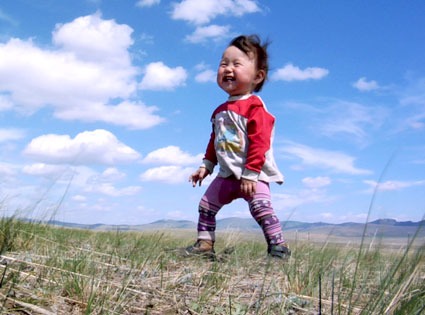 Focus Features
Focus FeaturesReview in a Hurry: It isn't for everybody, but this documentary about four newborns from far corners of the Earth does a terrific job of illustrating just how diverse an infant's first year can be.
The Bigger Picture: Everybody loves babies, as the marketing for this flick trumpets. And it's generally true, of course, but often we can forget what's actually so interesting about infants: their development.
How does a baby decide whether she likes a certain food? How does a baby react when he first discovers his feet—and realizes he can't reach them? Does a baby know she can dance?
Throw in the wildly diverse—and often surprising—ways an infant can reach adulthood on this planet, and you actually have a documentary that's pretty interesting to watch.
The French filmmakers behind the project scouted out four babies, each in a different place: Bayarjargal—Bayar for short—lives in Mongolia on a small family farm. Hattie was born to crunchy hippie folks in San Francisco. Mari is settled smack in the middle of bustling Tokyo, and Ponijao lives with her folks in a village setting near Opuwo, in Namibia.
The differences in parenting styles are striking.
For one, the adults of the Himba tribe, into which Ponijao was born, never wash and do not diaper their babies. Ever. The way that that Ponijao's poo is handled by her mother brought gasps in an audience screening, though, under director Thomas Balmes' still lens, there is no judgment on any of the families. Every child is loved; every child is healthy, and by the end of the film, all four are standing, walking and triumphant.
To his credit, Balmes knows where to point his camera.
Full faces of the parents are a rare sight; the movie isn't about the parents. It's about the babies—what they're thinking, and how they're reacting to their first days on Earth.
Even during intimate scenes, such as nursing, you rarely see a grown-up face, keeping the audience safe from the off-putting cooing of besotted adults. Instead, Balmes captures some brilliant scenes, including a sequence in which Mari discovers that even playing has its hardships.
Overall, the movie isn't a total revelation, but it isn't a failure, either, if for no other reason than it strips away the fuss that so often surrounds a baby's arrival. It simply lets babies be, with often engaging results.
The 180—a Second Opinion: People who don't necessarily find babies all that interesting may be turned off by the film's leisurely pace. There is no arc here. Just, you know, babies.
________
PHOTOS: Summer Movie Guide: Kids!